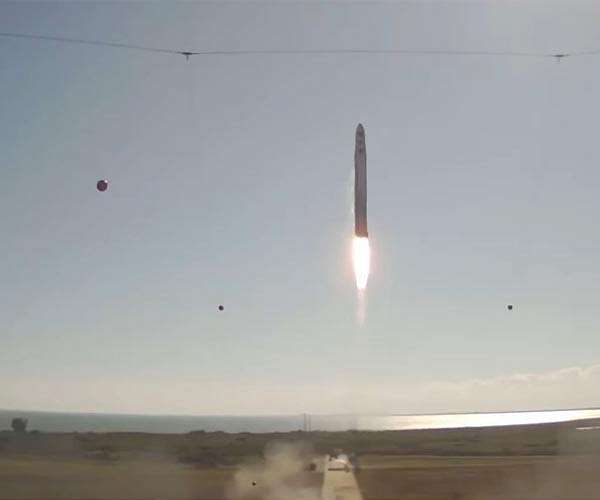California-based Astra Space suffered a rocket failure during launch of a NASA mission from Florida on Thursday after two previous delays.
The company’s stock plunged by more than 32% to $3.59 following the launch failure, but recovered a portion of that loss in subsequent trades. The plunge prompted a brief trading halt by the Nasdaq.
NASA’s Launch Services Program, which had hired Astra for the mission, posted a blog update acknowledging the failure.
“Missions like these are critical for developing new launch vehicles in this growing commercial sector. The Astra team demonstrated dedication to supporting NASA’s mission,” Hamilton Fernandez, mission manager, said in the blog post.
The Astra Rocket 3.3, named LV008, lifted off as planned at 3 p.m. EST from Complex 46 at Cape Canaveral Space Force Station. But video from the rocket appeared to show it tumbling through space for a few moments before the feed cut out.
Groans of surprise could be heard from launch controllers on the live broadcast.
“Unfortunately we heard that an issue has been experienced during flight that prevented the delivery of our customer payloads to orbit today,” Astra’s Carolina Grossman said during the live broadcast.
She apologized to NASA and several universities that had satellites on board, adding, “More information will be provided as we complete the review.”
More reactions came on Twitter following the loss of the rocket.
“We experienced an issue in today’s flight,” Astra CEO Chris Kemp posted. “I’m deeply sorry we were not able to deliver our customer’s payloads. I’m with the team looking at data, and we will provide more info as soon as we can.”
“Tough day for the Astra team. My heart goes out to them. Space is unforgiving. Wishing them a speedy data review and safe return to flight,” Morgan Bailey, director of communications for rival launch company Rocket Lab, also based in California, wrote.
Two previous launch attempts failed on Saturday and Monday due to ground equipment failure and a “minor telemetry issue,” respectively.
The stock also dropped about 14% on Monday after the launch abort, but recovered some value in the following hours and days.
Astra has faced criticism and skepticism of its business plan as it planned the Florida launch.
Thursday’s mission also was Astra’s first attempt to release satellites in orbit, or CubeSats. The four satellites were designed by NASA and university students.
The spacecraft were to conduct space experiments under a 2020 NASA contract award of $3.9 million to Astra.
NASA’s mission name for the spaceflight was ELaNa 41, which stands for Educational Launch of Nanosatellites.
Astra had a fast-tracked Federal Aviation Administration license for the launch under a new rule that attempts to streamline the licensing process.
The satellites were:
— BAMA-1, designed by University of Alabama, to test a type of spacecraft sail that would create drag in the upper atmosphere, leading to rapid deorbiting of the craft.
— INCA, designed by New Mexico State University, which stands for Ionospheric Neutron Content Analyzer and will study the neutron spectrum in low-Earth orbit.
— QubeSat, by University of California, Berkeley, which will test and characterize the effects of certain conditions on quantum gyroscopes in space.
— R5-S1, designed by NASA’s Johnson Space Center in Houston to demonstrate a fast and cost-effective way to build very small satellites by demonstrating some in-space camera inspection.
– Advertisement –
